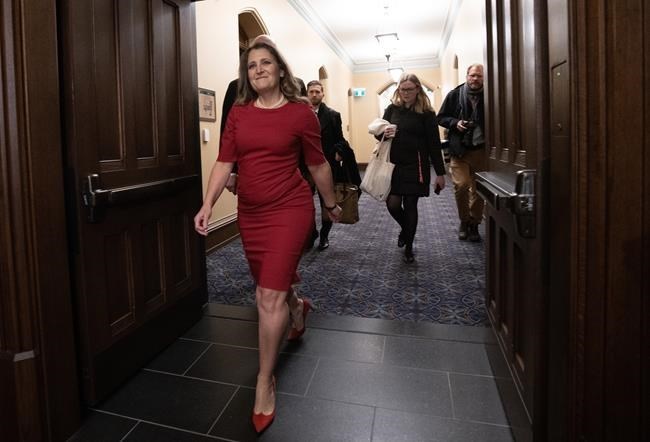OTTAWA — Almost half of the Canada Growth Fund for clean technology investments will be allocated to special contracts intended to give companies the confidence they need to make major investments to lower their greenhouse-gas emissions.
Finance Minister Chrystia Freeland used her fall economic update Tuesday to confirm that the fund – which she launched a year ago in the 2022 fall economic statement – would be the principal vehicle to deliver carbon contracts for difference.
She said up to $7 billion of the $15-billion fund will be set aside for contracts for difference, some of which are already –°¿∂ ”∆µ negotiated.
The contracts acknowledge that companies are making decisions to invest in things that lower their carbon emissions based on how much they expect to pay for the carbon price over several years. Those investments are only sound if they would cost less than what the company would pay in carbon pricing without the technology.
If the carbon pricing system changes in the future, the investments companies make to avoid paying it could become far less lucrative. Contracts for difference are an insurance policy of sorts against the carbon price going down or –°¿∂ ”∆µ eliminated, making the clean-tech investments less risky.
Freeland has been floating the idea of carbon contracts for difference for more than a year, as major energy companies, in particular, look for additional support to stay competitive in the face of the massive subsidies on offer under the U.S. Inflation Reduction Act.
She said on Tuesday that she wants Canadians to know no other country is competing harder with the United States for clean-tech transition investments.
"We are in a race, and we are committed to owning the podium. And that is what we saw in the budget in the spring, and that is what we see in this economic update," she said in a news conference just before tabling the fall update in the House of Commons.
"This is a plan to attract investment. It is a plan for the economic transformation, for the industrial transformation. Most of all, it is a plan for good jobs for Canadians today and tomorrow."
The contracts could be the final piece of the puzzle that major oilsands companies need in place to start building massive carbon capture and storage projects, which are critical if Canada wants to have any chance of meeting its next emissions targets.
The Pathways Alliance, an alignment of Canada’s biggest oilsands companies, is working toward such projects, but it has been looking for more support than was offered as part of a new tax credit for the technology.
The federal government provided additional details Tuesday about that tax credit, including a timeline for its finalization.
Pathways Alliance president Kendall Dilling said the group is pleased that the government intends to legislate the credit before the end of the year.
"Clear policy and legislation to support government investments in major emissions reduction projects are essential for the certainty we need to remain cost competitive with other oil-producing regions around the world," said Dilling in a statement.¬Ý
But Michael Bernstein, executive director of the non-profit organization Clean Prosperity, said it's the carbon contracts announcement that really has the potential to stimulate low-carbon economic growth in this country.
"These contracts have the potential to get some of Canada’s most promising industrial emissions reduction projects off the ground," Bernstein said in a news release.
"We ... need carbon contracts for difference to make Canada a competitive destination for low-carbon investment.”
Dilling said the Pathways Alliance is also encouraged that "the government has allocated more resources for carbon contracts for differences, and we look forward to working with the government and the Canada Growth Fund to see how they may be implemented for carbon capture and storage projects."
The Liberals' carbon pricing policy has been on politically shaky ground for years, amid heavy Conservative criticism.¬Ý
In recent weeks, Conservative Leader Pierre Poilievre moved to frame the next election around it, even though that election could still be almost two years away.
The Liberals' recent move to pause the carbon price for three years on home heating oil was seen by some pundits as a sign that even they were backing away from one of their signature policies, introducing further uncertainty to the system.
The fall update also promised some movement on previously announced tax credits for the clean-tech transition, with legislation to create tax credits for carbon capture and storage and clean technology expected in the next few weeks.
The document also says a long-awaited Indigenous loan guarantee program will be established to allow Indigenous communities to access the capital they need to be involved in major energy projects.¬Ý
However, the statement does not make clear if the guarantees would be offered for oil and gas projects as well as new clean energy projects.
Industry and communities alike have asked for that inclusion.
An Indigenous loan guarantee would protect lenders from potential defaults by including language that a third party — in this case, the federal government — would pay the bill should the borrower default.
Indigenous loan guarantees are already available in Alberta, Saskatchewan and Ontario, but the lack of a federal program has led to criticism from industry and First Nations leaders that jurisdictional gaps prohibit economic development.
This report by The Canadian Press was first published Nov. 21, 2023.
The Canadian Press

